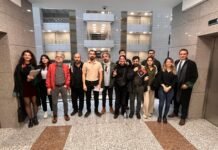The International Press Institute (IPI) and the Committee to Protect Journalists (CPJ) on Monday condemned the brutal detention of AFP photographer Bülent Kılıç while covering the İstanbul Pride March on Saturday.
Kılıç, an award-winning photojournalist, was taken into custody and released three hours later after his initial statement was taken at the police station.
Officers hit Kılıç in the face with his camera and threw the camera on the ground, breaking it, and then pinned him down by kneeling on his neck and back, according to an interview the journalist gave to the local independent Anka News Agency.
“Turkish authorities should thoroughly investigate all police personnel involved in the detention of photojournalist Bülent Kılıç and the life-threatening violence he was subjected to,” said Gulnoza Said, CPJ’s Europe and Central Asia program coordinator. “Authorities in Turkey must accept that reporters have a right to cover the news in the field and take concrete action to prevent police officers from harassing them.”
Kılıç said he planned to file a criminal complaint against the police officers for disproportionate use of force. “They tried to kill me, they tried to prevent me from breathing. They will be held accountable in court,” he said in a tweet.
Canıma kast edilmeye çalışıldı, nefesim kesilmek istendi, bana bunu yapandan, Anayasa Mahkemesi, Avrupa İnsan Hakları, her ne ise, bu Dünya’da hangi mahkemeyse hesap soracağım, yaşadığım sürece bunun mahkemede hesabı verilecek. Ulu Divan’a kalmayacak.#NefesAlamıyorum #Pride2021
— Bulent KILIC (@Kilicbil) June 26, 2021
The İstanbul police issued a statement yesterday stating that a journalist was “unfortunately” among those who were “caught while resisting the prevention of the illegal demonstration” and said that an investigation had been opened in response to a criminal complaint filed by the journalist. The statement said 46 people had been arrested at the march.
“Police violence against citizens, protestors and journalists covering public demonstrations has been intensified in recent years in Turkey, and has been given further cover by a police directive in April 2021 granting the power to stop anyone reporting on protests. Bülent Kılıç’s brutal detention while covering the Pride March was merely the clearest example of disproportionate use of force by the police,” IPI Turkey Programme Coordinator Renan Akyavaş said. “No journalist’s safety can be risked due to police brutality. We stand in solidarity with Kılıç in his search for justice against police violence.”
Press freedom activists are planning to gather in İstanbul, Ankara and İzmir on Tuesday to protest Kılıç’s treatment, according to a Twitter thread by the Journalists Union of Turkey, which said the groups were using the hashtag #nefesalamıyoruz (“we can’t breathe”) to organize.
Artık yeter! #NefesAlamıyoruz
Gazetecilere yönelik polis şiddetini protesto etmek ve suç işleyen kamu görevlilerinin cezalandırılmasını sağlamak için bir araya geliyoruz.📍İstanbul Valiliği Önü
🗓️ 29 Haz. Salı 🕑 14.00 pic.twitter.com/LUgEWNyp3l— Gazeteciler Sendikası (@TGS_org_tr) June 28, 2021
Turkish journalists are often targeted and jailed for their journalistic activities. Turkey is one of the world’s biggest jailers of professional journalists and ranked 153rd among 180 countries in terms of press freedom, according to Reporters Without Borders (RSF).
According to the Stockholm Center for Freedom’s “Jailed and Wanted Journalists in Turkey” database, 172 journalists are behind bars in Turkey and 167 are wanted and either in exile or at large.














